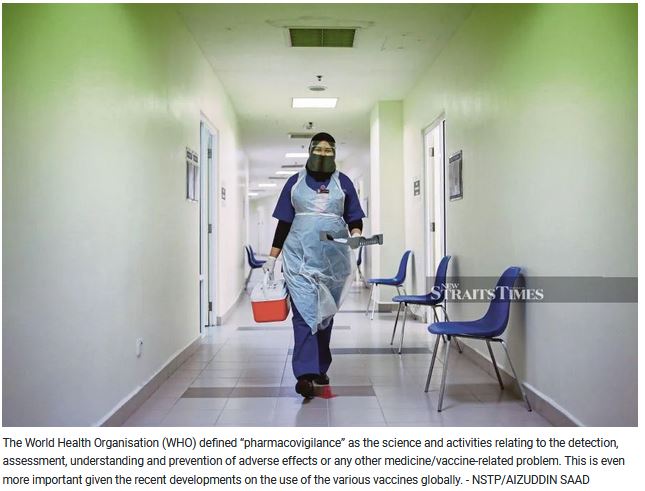Complete information on risks and benefits of inoculations vital to build trust
Emeritus Professor Tan Sri Dato' Dzulkifli Abdul Razak
Opinion - New Straits Times
April 27, 2021
THERE is more to vaccination than just offering your arm for a jab. Once the vaccine is in the body, it is the start of a new episode.
The World Health Organisation (WHO) defined "pharmacovigilance" as the science and activities relating to the detection, assessment, understanding and prevention of adverse effects or any other medicine/vaccine-related problem. This is even more important given the recent developments on the use of the various vaccines globally.
Initially, evidence of safety and efficacy is limited to the results from clinical trials, where patients are carefully selected and closely followed up under controlled conditions. For example, until today, children under the age of 16 are generally excluded. Tests are confined to a relatively small number of selected patients for a shorter period.
Unexpected adverse effects may emerge once the product is introduced to a diverse population (including people with other concurrent diseases), and over a longer time. Hence, following authorisation, vaccine use is likely to provide many other information not observed before, including new side effects under a variety of circumstances.
Here is where pharmacovigilance comes into play in monitoring the safety of all medicines/vaccines throughout their use in all healthcare practices. In the European Union (EU), the European Medicines Agency (EMA) coordinates the EU pharmacovigilance system.
EU law requires each marketing authorisation holder, national competent authority and EMA to service a pharmacovigilance system. The overall EU pharmacovigilance system operates in cooperation with EU member states, EMA and the European Commission.
In some member states, regional centres are in place under the coordination of the national authority. Early last month, some four weeks after the first AstraZeneca vaccine was administered in Europe, some early warnings were detected.
Reportedly beginning in Austria, then Denmark, Norway and Iceland, European healthcare regulators began to report small numbers of people experiencing blood clots or had died. Later, several cases in Germany were announced, with a number of deaths. All these led to the suspension of the vaccine.
However, in the country of origin where the AstraZeneca vaccine was rolled out a full month ahead and 11 million doses had allegedly been administered, "there was nothing", according to the Telegraph.
The British regulatory agency said "it could see no evidence of a problem", and "reports of blood clots received so far are not greater than the number that would have occurred naturally in the vaccinated population".
Unfortunately, this is not the case, as an investigation by the Telegraph found. The signals were there but had "gone unnoticed for at least a month, perhaps longer". The issue finally came to a head when seven deaths were reported towards the end of last month involving "unusual" blood clots in the brain. In other words, pharmacovigilance seemed to have been compromised nationwide.
In this vein, what will be the consequences in places where there are limited pharmacovigilance and lagging post-market surveillance, generally in low- and middle-income countries?
While it is desirable to conduct safety surveillance on all Covid-19 vaccines, this is not possible when the bulk of recipients are less aware and educated on the need to provide accurate and timely data to the authorities to support evidence-based recommendations on the vaccines.
Short of this, the outcome on national and international policymaking, as well as the level of confidence in the vaccines will be marred. This can be even more stark in the developing world.
A functional and reliable pharmacovigilance system to track the effects where billions of doses are being deployed in all sorts of situations and conditions cannot be overemphasised.
In order to build trust for a successful immunisation programme, it is not just a matter of combating false information, but also making available open, timely, transparent and evidence-based communication on the potential risks (not just benefits) to recipients. This is essential for a successful immunisation programme globally and nationally.
The writer, an NST columnist for more than 20 years, is International Islamic University Malaysia rector

